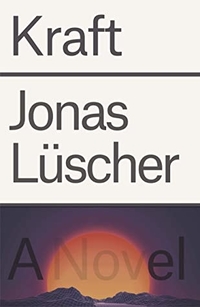Kraft by Jonas Lüscher
 Friday, January 1, 2021 at 5:22AM
Friday, January 1, 2021 at 5:22AM 
First published in Germany in 2017; published in translation by Farrar, Straus and Giroux on November 10, 2020
Kraft is the story of an intellectual named Richard Kraft. The story begins in the present, as Kraft is invited to America to compete with other scholars for a million-dollar prize. His task is to write and present an essay on “Why Whatever Is, Is Right and Why We Can Still Improve It.” Kraft understands the topic to be based on the proposition that we live in the best of all possible worlds — presumably because it was created by God — and that the best possible world is nevertheless permeated by evil, which suggests that evil can’t really be so bad. Or perhaps it is bad for the individual but necessary for the greater good of the whole. Kraft doesn’t agree with Alexander Pope’s thesis that “Whatever is, is right” — Kraft is no fan of theodicy — but he needs the million so he endeavors to craft an essay that will appeal to Tobias Erkner, who has funded the competition and will judge the competitors.
Kraft is a professor of rhetoric. Years earlier, as a student in West Germany, striving to stand out in intellectual circles, Kraft embraced neoclassical theory and market liberalism, the trickle-down notions of capitalism that were championed by Ronald Reagan’s advisors. Kraft understands that he has embraced ideas that are the economic equivalent of theodicy because they demand the acceptance of evil (in the form of poverty and injustice) as natural and beneficial to the greater good. He also understands that advancing in the intellectual world doesn’t require him to actually believe the ideas that he defends. As he struggles with his essay, Kraft knows he will need to dress up an economic system that repels him “with an aura of divine ordainment” because Erker is rich and will want to hear that his wealth is the outcome of a natural social order that recognizes his entitlement.
Flashbacks to and beyond Kraft’s student days tell of his friendship with István (a like-minded intellectual), his relationship with Ruth Lambsdorff (who fled without explanation, stimulating Kraft’s “vain craving for admiration”), his equally unsuccessful relationship with Johanna Hueffel (who, years later, takes issue with Kraft’s memory that she fled from him in anger), his past and present unhappy marriages and his ambiguous relationship with his children. Through all of this, Kraft sees himself as an honorable man, although it belatedly dawns on him that others might see him as a monster. In fact, he is neither or both. He would like the freedom of another divorce, but he can’t afford freedom unless he wins the million, a circumstance he finds shameful.
An undercurrent of comedy runs through the story. Usually understated, the comedy occasionally yields slapstick moments (Kraft being found naked in a field near Stanford after a “rowing adventure” is one example). István is almost a comic figure, a man who poses as a dissident intellectual who defected from Hungary when, in fact, he entered Germany as the shirt-washer for the Hungarian chess team and stayed behind when the bus left without him, the officer in charge having failed to notice his absence. The German obsession with David Hasselhoff also inspires some chuckles.
The moral question that Kraft must ultimately confront is whether he can dress up drivel as intellect — drivel he sees through and knows he cannot justify, despite his ability to advance arguments that purport to be honest — for money. Is the cost of being an intellectual sellout outweighed by the greater good of providing for his family? But this has been Kraft’s dilemma throughout his life. His dissertation extolled an economic system that he found repugnant and in which he had so little confidence that he spread the dissertation in all directions, welding on “any number of reinforcements and pointless rivets,” plastering it with his “stupendous knowledge of the relevant secondary literature,” and varnishing it with eloquent rhetoric to disguise its dishonesty.
Kraft is a fascinating novel because of its serious discussion of abstract philosophical concepts and their application to a concrete world. A dissenting voice (who doesn’t need the million dollars) argues that everything that is, is bad: rising nationalism, open acceptance of racism, the democratic election of despots, the embrace of anti-intellectualism and the “legitimation of ignorance,” the failure of countries like India and China to provide hope for a better future to their citizens. Kraft ponders an alternative view — that the coming Singularity that will advance humanity by merging real and artificial intelligence — but wonders whether the Singularity will lead to the enslavement of man by machine. It’s tough to be intellectually honest.
The novel’s humor doesn’t attempt to disguise the reality that world is a bleak place, for some more than others. The novel’s ending is also bleak, perhaps to drive home the point that sunny optimism alone can’t change reality. The ending struck me as something of a cop-out but it reflects a choice that, in a world of infinite choices, might be as valid as any other. Putting the ending aside, I admire Kraft for Jonas Lüscher’s willingness to confront the profound without forgetting that people of all intellectual levels muddle through their lives as best they can, struggling only occasionally (if at all) to make sense of it.
RECOMMENDED
Reader Comments